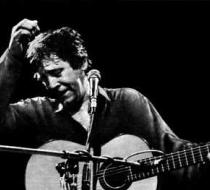Paco Ibáñez (Valencia, November 20th, 1934) Favorite
Francisco Ibáñez Gorostidi (known as "Paco Ibáñez") is a spanish singer that has dedicated almost all his career to turning poems by classical and contemporary spanish and latin american authors into songs.
Paco Ibáñez was born in Valencia, but he spent his early years in Barcelona. After the Spanish Civil War (1936-1939), her family had to move to France, because his father was a member of CNT (Confederación Nacional del Trabajo), an anarcho-syndicalist association. Between 1939 and 1942, he lived in Paris, until his father was arrested an taken to a concentration camp for spanish republicans due to the german occupation of France.
His family then went back to Spain and settled in San Sebastián-Donosti, until in 1948 they were able to cross the border under cover and meet Paco's father in Perpignan (France). Said father taught him the secrets to become a cabinetmaker. Meanwhile, Paco was learning how to play the violin and he guitar. When they move to Paris in the early 50s, he starts exploring the world of poetry and turning Luis de Góngora's and García Lorca's poems into songs. He released his first recorded songs in 1964, and his record quickly became both an education resource for Spanish Literature teachers, and a symbol of cultural resistance.
In 1966, he founds "La Carraca" with other spanish cultural activists that were living in Paris. They played pieces of spanish theater, held literary talks and organized exhibitions, concerts and movie nights. His house starts sheltering many spanish politicians, intellectuals and artists that go to Paris as part of their exile or as a way to temporarly escape the drabness and boredom of Franco's regime.
He releases his second album in 1967. In 1968 he offers his first concert in Spain, in Manresa, and he becomes famous, especially among university students. He is even permitted to sing Miguel Hernández's "Andaluces de Jaén" in the spanish national television.
However, he will soon encounter the intolerance of the francoist dictatorship. In 1969 he offers a concert for the first anniversary of the events of May 1968, and another one in the Olympia theater in Paris. Both were very successful, and strenghtened Paco's role as a symbol of cultural rebellion. In 1971, the spanish government puts his name in a black list of censored authors, banning him to perform in Spain. Because of this, he goes back to Paris and starts traveling around the world, especially to Latin America.
In 1975 Franco dies, and the censorship ends, but Paco stays in Paris for a few more years. He is invited to participate in several concerts in Spain, but he refuses to do it. However, he collaborates with the CNT, that had just been legalized after 36 years of prosecution. After a few years, he participates in the electoral campaing for general elections, offering a concert for the last meeting by the Socialist Party, that will win the elections that year.
During the eighties he was offered the Médaille de l'Ordre des Arts et des Lettres by the french government, but he rejects it to mantain the integrity of his principles. He has also been offered the Gerald Brenan Award by the Sociedad Cultural Andaluza, but he has rejected it as well.
In the early nineties he releases a new album and moves back to Spain, first to Madrid and then to Barcelona in 1994. He keeps singing and performing, and songs are still referenced by social movements and political activists as symbols of freedom and resistance.








